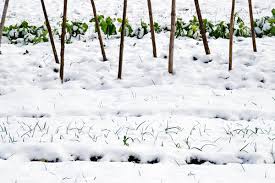How to Prepare your Garden for Winter?
 Get rid of dead plant material: Bugs often lay eggs on plant material in your garden. If you leave these old vines and plants sitting around all winter, the eggs may hatch in the early days of spring and you will be left with a fresh batch of pests to deal with.
Get rid of dead plant material: Bugs often lay eggs on plant material in your garden. If you leave these old vines and plants sitting around all winter, the eggs may hatch in the early days of spring and you will be left with a fresh batch of pests to deal with.
Apply some compost: One of the best tips I can provide on how to prepare your garden for winter is to feed it! Your garden soil has used up all its nutrients growing plants this summer. It is spent and needs a refuel. The garden really isn’t stagnant unless the soil is completely frozen. Work some compost in now and give it time to start breaking down a bit during the cool but not frozen temps of fall. In early spring, before you plant, the process will continue and you will have nutrient rich soil to plant your next crop in.
Pull up weeds: While you may think those weeds are actually dead, they will create a nightmare for you in the spring. Pull them up now, before the soil gets too hard to deal with. Do it after a nice rain when roots are soft and easy to pull out of the soil.
Clean your garden tools: Any garden tools that you have been using should be cleaned before being stored inside for the winter. Use some hot soapy water and let them dry thoroughly before you put them away. If you know you have had some diseased plants in your garden, you may add a drop of two of bleach to the water to kill any leftover disease on your garden tools. Otherwise you may spread it to your new plants next spring.
Allow root crops to keep growing: Many root crops are cold tolerant and will continue to grow for quite a while once the weather gets cold. Mulch them with a thick layer of straw or hay. Some root crops may even store better if you leave them in the ground rather than pulling them up and trying to keep them fresh indoors.
Consider a cover crop: In order to help prevent erosion, consider planting a cover crop. You want one that can be turned into the soil in the spring that will provide plenty of nutrients for your soil.
Preparing your garden for winter can help you have a higher yield and a smaller chore list come spring.